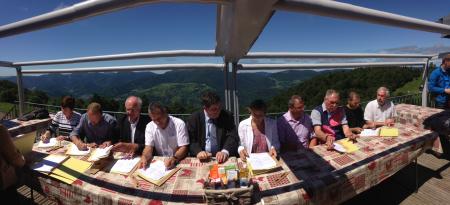
Objective:
A multi-stakeholder approach has been initiated in the Hautes Vosges on stubble in the Markstein - Grand Ballon sector to preserve the resource of Arnica montana ssp montana and its natural habitat (the "high stubble"), to maintain the economic issues that represents its picking, while reconciling the other uses of high altitude grasslands where this plant grows : cattle grazing, grass harvest, outdoor sports (skiing, gliding).
Context:
Arnica montana, ssp montana is a vulnerable species (community interest, also present in the red list of Alsatian threatened flora). It is difficult to cultivate and its distribution is very limited. Several threats have been noted:
- Its medicinal stake is high and the pressure of picking is very strong on the Vosges mountains of Markstein.
- Acid and poor altitude grasslands on which they can grow are also areas of summer grazing and mowing, and the practices of agricultural improvement, modifying the degree of acidity and the composition of the soil, threatens their survival. .
- Moreover, this territory is an area of outdoor sports that induce trampling or heavy development, undermining the survival of the Arnica.
The Regional Nature Park has been mandated to organize a protection approach.
Contacts:
Fabien DUPONT, f.dupont@parc-ballons-vosges.fr , https://www.parc-ballons-vosges.fr/agir/les-actions/convention-arnica/
Michèle LAGACHERIE, michele.lagacherie@cnpf.fr, https://occitanie.cnpf.fr/